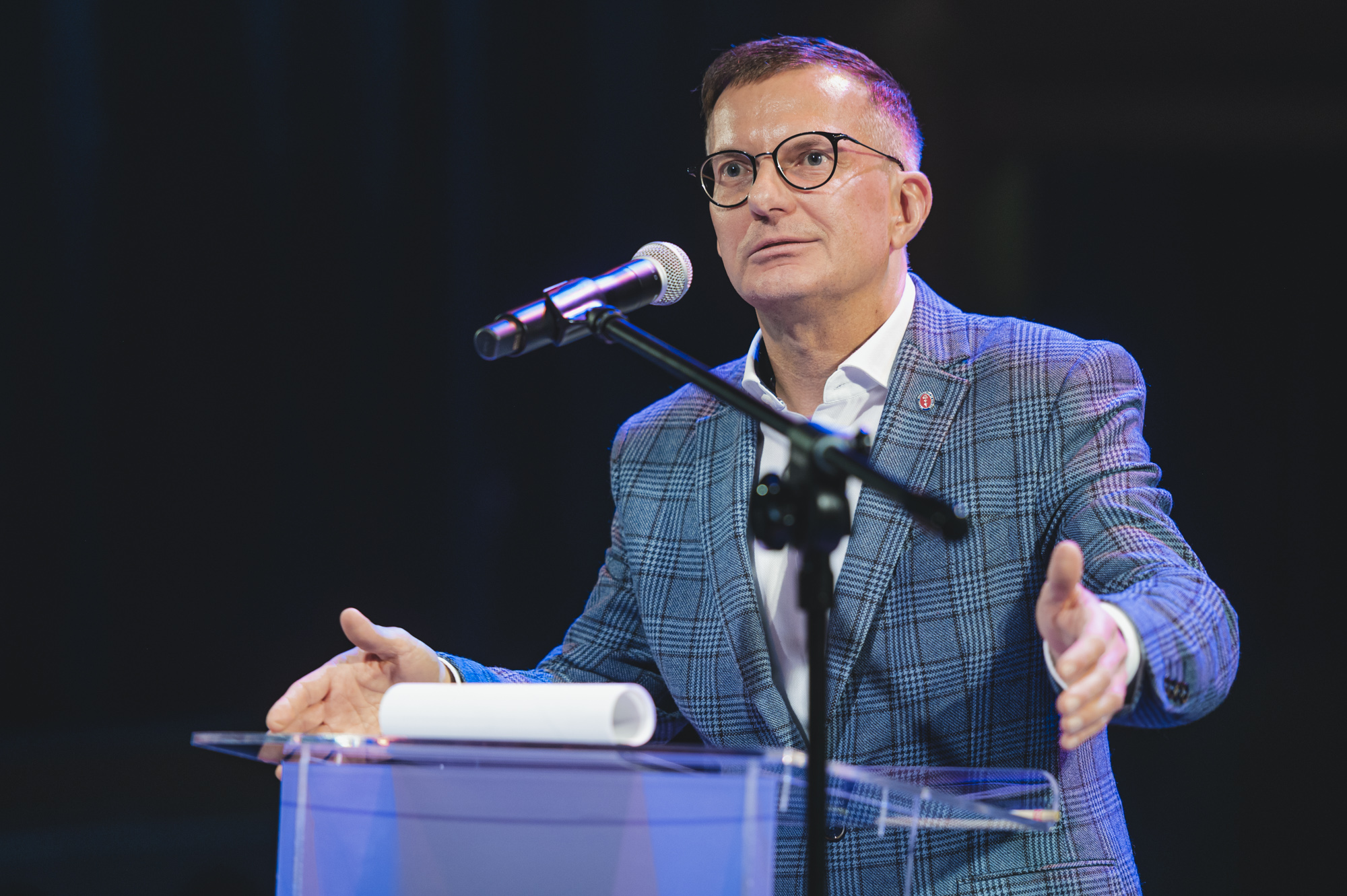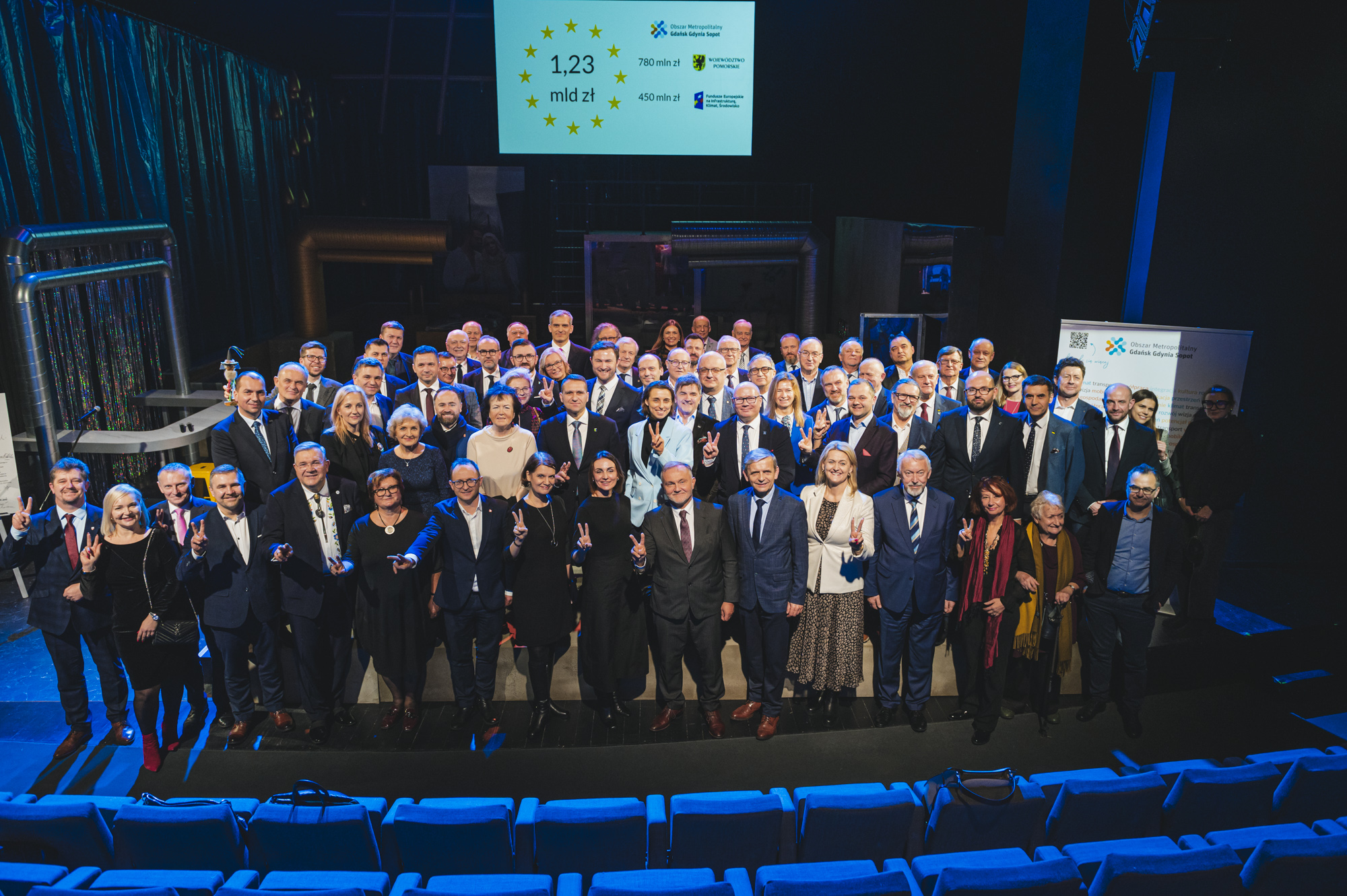Report on the 10th Metropolitan New Year's Meeting
A summary of the work on the strategy for the metropolis up to 2030, the investment package in the new EU perspective, the Metropolitan Act, as well as cooperation between business and the scientific and local government communities – these were the main topics of the 10th Metropolitan New Year's Meeting, which took place on 15 February 2024 at the Wybrzeże Theatre in Gdańsk. The meeting was attended by local government officials from the Gdańsk-Gdynia-Sopot Metropolitan Area (GGSMA), member of Parliament, senators, business representatives and the authorities of the Medical University of Gdańsk, Gdańsk University of Technology and University of Gdańsk.
This was the tenth meeting of the four key circles jointly creating the metropolis: the local government and central government administration, business local government, as well as science and civic circles. The event is held in a different location each year. This year, activities at the metropolis level were summarised and planned at the renovated Wybrzeże Theatre. The meeting began with speeches by the mayors of the Tri-city.
– The last year was the time we had waited a long time for. It was the year in which local government officials breathed a sigh of relief. We can look forward to the future with optimism. The partnership-based approach between the central authorities and local governments in talks on how to shape local government finances and build the quality of life in our communes in a partnership-based way is coming back," said Wojciech Szczurek, the Mayor of Gdynia, President of the GGSMA Council.
– The three new MP's from our region are a former head of the commune, mayor and deputy mayor. We very much count on you, especially when it comes to the Metropolitan Act. I hope that all our plans will become even more real in 2024. I believe that this will be the golden era for Pomerania and the metropolis, especially with such a team who have demonstrated that, even in unfavourable external conditions, they know how to work together and create a community that serves others," said Aleksandra Dulkiewicz, Mayor of Gdańsk, Vice President of the OMGGS Council.
– The metropolis is the reality. Our citizens, when they look for jobs, schools and kindergartens, do not look at one city, but they look metropolitan. This mobility is a great advantage. On top of that we would like to add good public transport so that residents not only move around efficiently, but also are even more willing to live and work in the metropolis – said Magdalena Jachim, Acting Mayor of Sopot.
The event took place exactly 10 years after signing the Agreement of the Union of Integrated Territorial Investments 2014-2020, which gave rise to cooperation between communities and to more than 200 projects with a total value of PLN 3.67 billion with EU funding of PLN 1.88 billion. The results of metropolitan cooperation include: transport hubs, cycle paths, renovated public and municipal buildings, revitalised city districts, new buses, trams and trolleybuses, new tram lines, expanded district heating networks, geriatric hospitals, modern services for entrepreneurs and support for the disadvantaged.
Strategy to 2030 and the project package in the new perspective
The New Year's meeting was an opportunity to summarise the work on the GGSMA Strategy, which sets out the most important actions for the metropolis for the coming years. These activities include issues such as climate and space, efficient transport and harnessing economic and social potential. Michał Glaser, President of the Management Board of the OMGGS, presented further projects, too. As part of the new EU perspective, the metropolis will implement more than 100 of them. These will include the construction and redevelopment of transport hubs, the construction of a tram line, cycle paths and bus lanes, psychotherapeutic support for children and young people, thermal modernisation of schools, kindergartens and municipal buildings, the expansion of green areas, day care centres, day care rooms and clubs for senior citizens, as well as support for immigrants. EU funding from regional and national programmes will exceed PLN 1.23 billion.
One of the action priorities for 2024 is the Metropolitan Act, which the Pomeranian local authorities have been seeking for nearly eight years. The draft act, within the Senate's legislative initiative, went to the Sejm, where the draft spent two years in the so-called Sejm freezer. Early last year, MPs decided to reject the first reading.
The metropolis means cooperation of many communities
The New Year's meeting brought together not only the mayors, heads of the counties and communes, but also the MPs, senators and representatives of the business, economic and scientific circles. Beata Rutkiewicz, Head of the Pomorskie Region, spoke about the important role of the metropolis in public policy coordination, and presented the most important objectives and challenges for the coming year. Prof. Marcin Gruchała, President of the Assembly of the Fahrenheit Universities, Rector of the Medical University of Gdańsk, spoke on behalf of the academic community.

– Thank you all, both the local government, business and civic circles, for your enormous support and kindness with which the idea of creating the Fahrenheit Universities was put forward. This shows that in Pomerania, we like ideas that bring people together – said Prof. Marcin Gruchała. – I am counting on this support also for legislative changes enabling the creation of the federation, which we, as the Union, are actively seeking.
Zbigniew Canowiecki, Chairman of the Economic Convention at the Fahrenheit Universities, and Jakub Kaszuba, who presented the assumptions and outcomes of the activities of the Metropolia Think Tank, established exactly one year ago, talked about cooperation between business, science and local government. The latter discussed the vision and development directions for the Metropolitan Area as prepared by the working teams, and then presented three projects to make the vision real.
fot. P. Hukało


